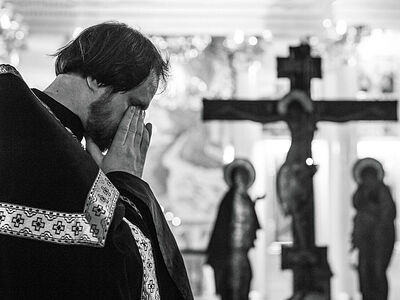The three kinds of responsibilities of Man. The responsibility to oneself; the development of a spiritual personality (differentiated from egoism). The gradualness of this development.
A Christian living in this world is found in a continuous, live interrelationship with God and his neighbors, the surrounding people.
In addition, a Christian cares about himself for the duration of his life, about his physical well-being and spiritual salvation. Thus, his moral responsibilities may be divided into three groups: 1) the responsibility to himself, 2) the responsibility to his neighbors, 3) the highest responsibilities to God.
The first, most important responsibility of an individual is to himself the improvement of his spiritual personality within himself through work, of his truly Christian “I”. The spiritual personality of a Christian is not something given to him from the beginning, this is something sought after, acquired and worked for by his personal effort arid exertion. Neither the body of a Christian, with its abilities, strengths, and strivings, nor the very soul, as the congenital center of his conscious experiences, as life’s beginnings. It’s his–spiritual personality, the spiritual “I”. This spiritual personality within every Christian is that which sharply differentiates him from every non-Christian, and the Holy Scriptures call this not the soul, but the spirit. This spirit is precisely the center, the concentration of the spiritual life, the striving towards God and eternal, blessed, infinite life. In this particular case, it may be rephrased. Namely, the problem of the earthly life of every individual is exactly that he be able, during this life to create and work out his spiritual personality, his genuine, live and eternal “I”.
One can care about his “I” in various ways. There are people who are: called egotists and who care very much for their “I” and lull it.
But an egotist thinks only about himself and no one else. In his egoism, he strives towards getting his own happiness in any way, even at the cost of bringing suffering and unhappiness to his closest neighbor. In his blindness, he does not notice that from the point of view of Christianity’s true understanding of life, he only harms himself, his eternal “I”.
Here, Christianity, summoning a person towards the construction of his spiritual personality, commands him as a way of this building to differentiate between good and evil, and the truly beneficial from the seemingly beneficial arid harmful, Christianity teaches us that we must consider everything given to us by God, our health, abilities, congenital virtues and qualities as not our own “I”, but as given as a gift from God. This we must use (like the materials for constructing a building) for the construction of our Spirit. We have to use all these “talents” given by God, not only for ourselves, egotistically, but for others. The laws of Heavenly Truth are contrary to the law of earthly profit. According to earthly considerations, one acquires wealth (for eternity), if he gives it away and does good in his earthly life. In the famous parable of the unrighteous steward (Luke 16), the main thought and key for its correct understanding is the principle of the differences between the concepts of earthly egotism and Divine Truth. In this parable. Our Lord straightforwardly called earthly riches, gathered egotistically, for oneself, as “the mammon of unrighteousness” and commanded to have them used not for oneself, but for others in order to be accepted into the eternal habitations.
The ideal of Christian perfection is unreachably high. Be ye therefore as perfect, even as your Father which is in heaven is perfect. (Mathew 5:48). The work of a person with himself, with his spiritual personality cannot have an end. The entire earthly life of a Christian is a dispassionate labor of moral self-perfection. And of course, Christian perfection is given not immediately but gradually. Righteous Seraphim of Sarov told one Christian who wanted to suddenly achieve saintliness (perfection) because of his inexperience to “do everything little by little and not suddenly; virtue is not a pear, you cannot eat it suddenly…” Apostle Paul, with all his spiritual height and might, did not consider himself as having achieved perfect ion, but said, that he only strives towards such a perfection, I press toward the mark for the prize of the high calling of God in Christ Jesus (Phil. 4:12–14).







